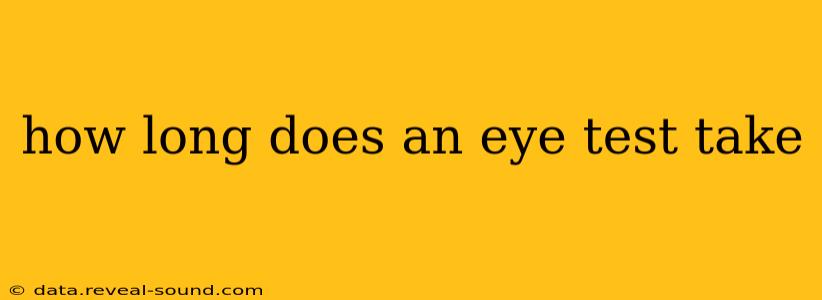An eye test, also known as a comprehensive eye exam, isn't a one-size-fits-all affair. The time it takes can vary significantly depending on several factors. While a quick vision screening might only take 15-20 minutes, a thorough comprehensive eye exam can easily extend to an hour or even longer. Let's delve into the factors that influence the duration.
What Factors Determine the Length of an Eye Exam?
Several factors contribute to the overall time investment required for a comprehensive eye examination:
- Your individual needs: If you're experiencing specific vision problems or have a history of eye conditions, the optometrist will need to conduct more detailed tests to accurately diagnose and manage your care. This naturally adds time to the appointment.
- The type of exam: A basic vision screening primarily focuses on determining your refractive error (nearsightedness, farsightedness, astigmatism) and prescribing glasses or contact lenses. A comprehensive exam goes much deeper, assessing overall eye health and looking for potential problems.
- The optometrist's approach: Some optometrists might be more thorough or take more time with patients than others.
- Additional tests required: Depending on your needs or any pre-existing conditions, you may require additional tests, such as dilation, visual field testing, or imaging tests (like OCT or optical coherence tomography). These tests add considerably to the overall time.
- Waiting time: Remember to factor in potential waiting time before your exam begins. This can vary significantly depending on the clinic's scheduling and patient volume.
What Happens During a Comprehensive Eye Exam?
A comprehensive eye exam typically involves several key steps:
- Visual acuity test: This assesses your sharpness of vision using an eye chart.
- Refraction: This determines your refractive error and helps determine the prescription for glasses or contacts.
- Eye muscle and coordination tests: This evaluates how well your eyes work together.
- External eye examination: The optometrist visually inspects your eyelids, cornea, and other external structures.
- Internal eye examination: Using specialized tools, the optometrist examines the internal structures of your eye, including the retina and optic nerve. This may involve pupil dilation.
- Intraocular pressure measurement (tonometry): This measures the pressure inside your eye to screen for glaucoma.
- Additional tests (if necessary): As mentioned, depending on your needs, additional tests like visual field testing or imaging may be required.
How Long Does it Take to Dilate My Pupils?
Pupil dilation, usually done with eye drops, takes about 30-45 minutes to fully take effect. The dilation itself usually lasts several hours, meaning your vision will be blurry during this time. Plan accordingly for transportation home after your exam if dilation is required.
What Can I Expect During an Eye Exam?
Expect a variety of tests and procedures designed to assess your vision and eye health comprehensively. The optometrist will explain each step and answer any questions you may have. Your comfort and understanding are important throughout the process.
How Can I Prepare for My Eye Exam?
Arrive on time for your appointment and bring your current eyeglass or contact lens prescription, along with your insurance information. Bring a list of any medications you are taking and, of course, any questions you have for the optometrist.
In conclusion, while a quick vision screening might only take 15-20 minutes, a comprehensive eye exam, which is crucial for maintaining good eye health, can easily take an hour or more. The duration depends on your individual needs and the complexity of the tests involved. Always discuss any concerns or questions with your optometrist to ensure you receive the most appropriate and thorough eye care.
